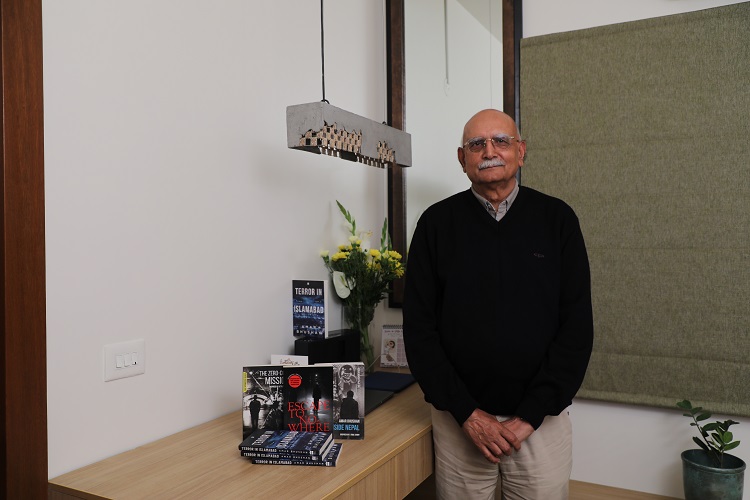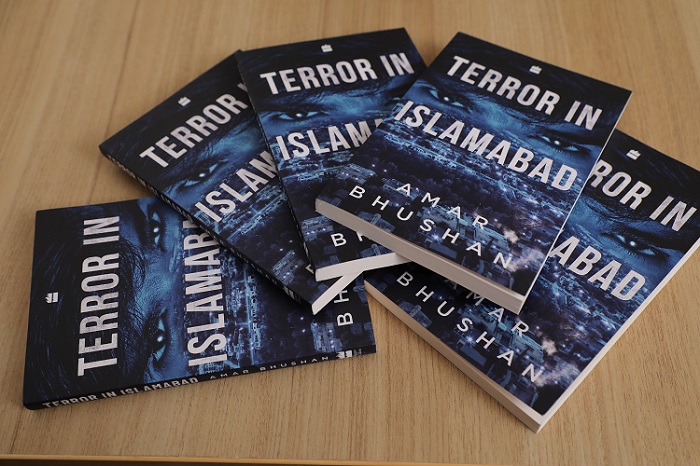A brilliant book on real life incidents in Pakistan and why the nation should never be taken seriously when it says it is tackling terror.
Inside Pakistan, Inside Terror Land
Every time you walk into Pakistan, suspicion follows you like your shadow. There would, of course, be bonhomie, the usual banter, Biryani joints and the late night dancing soirees in the backstreets. Still, you will feel the heat.
And more so if you are an intelligence agent from India, an official of the Research and Analysis Wing (RAW). Terror in Islamabad from Harper Collins is a brilliant one penned by Amar Bhushan who worked with the Intelligence Bureau (IB), BSF Intelligence, State Special Branch and most importantly, in RAW for nearly a quarter of a century. And that he oversaw working in Islamabad is both crucial and important, ostensibly because he closely observed a nation that is mired in terrorism but on face, remains calm and says it has fought and eradicated the menace of terrorism from its soil by carrying out arrests, seizing property and freezing bank accounts of groups designated as terrorists by the United States and the United Nations.

But in reality, Islamabad routinely makes these announcements hoping it will help the nation get off a global blacklist for financing terrorism and money laundering. Bhushan knew all about Pakistan’s history of supporting militants. He also knew even if Pakistan were to be blacklisted, the country’s financial transactions would be subject to greater scrutiny, a move that could discourage investment and further isolate its struggling economy.
But like a leopard that doesn’t change its spots, Pakistan will not change its colours. Pakistan would continue to foment trouble in India (read Kashmir) and trigger tensions in other parts of India. The Trump administration pressured Pakistan to crack down on terrorism within its borders as US negotiators work to finalize a peace deal with the Taliban in Afghanistan that would pave the way for the withdrawal of thousands of American troops. That is something that happened recently, not when Amit Munshi, Bhushan’s protégé worked in that terror-prone country.
Barring a few cricket matches and some diplomatic conversations, India and Pakistan have never been on the same page, Munshi learnt it the day he walked into Pakistan, he knew he will have to handle people who do terrorism financing and money laundering as if they were buying milk for the household.
The book is gripping, it opens up the realities of Islamabad — the zone for plotting terror — and cities like Rawalpindi and Lahore, where each move of the government officials in Pakistan are superficial, where they openly blame Washington for overstating Pakistan’s role in encouraging the Taliban to strike attacks against US soldiers in next door Afghanistan.
Terror in Islamabad highlights Pakistan’s reputation at a time when the country was looking to the international community for loans and foreign investment. Bhushan narrates very grippingly how dangerous it is for an Indian operative to work in Pakistan where the counterintelligence forces keep everyone in the Indian embassy on the hotlist. During meetings, Indian diplomats tell their Pakistani counterparts that what India is looking for is for Pakistan to not only arrest militants, arrest their leaders, put the leaders on trial, but also shut down the entire infrastructure of these financing networks. Once the meetings are over, the Pakistani officials laugh their hearts out and get into their vehicles, some carrying stickers saying Crush India.
Bhushan narrates the fear of working in Pakistan, a land of scenic beauty and horrifying incidents of assassinations and blasts. I picked up some of the portions from the book which is already on the social media and worth reproducing here. So the book’s central character is a person named Amit Munshi who, actually, is Veer Singh. He is in the Indian High Commission as a cultural attaché but working for RAW.
Select excerpts from Terror in Islamabad
Amit Munshi figured in the Indian embassy’s diplomatic list as cultural attaché, but that was his cover job. He was actually an officer of India’s external intelligence agency and his real name was Veer Singh. Living a duplicitous life, he had been functioning in Pakistan overtly as an officer from the Ministry of Culture on deputation to the Ministry of External Affairs and covertly as an intelligence operative under an assumed name. The stress of carrying Amit Munshi’s guise proved at times unbearable, but he had managed to carry it flawlessly. In fact, within two months of his arrival in Islamabad, he began enjoying his interactions with artists from both India and Pakistan as well as his meetings with sources. He found it fun, playing hide-and-seek with watchers from Pakistan’s Inter-Services Intelligence (ISI), the Pakistan Intelligence Bureau and the Islamabad Capital Territory Police.
Amit, however, had one regret. He had to leave his wife Bhama and his kids in Delhi. There were times when he desperately longed for their company, especially when the pressure of work hemmed him in from all sides and he returned to his huge bungalow after a long day at the office, tired and forlorn. He also missed Bhama being at his side when he had to make social calls on prospective sources. But it did not take him long to realize that he had made a wise decision by not bringing her and the children to Islamabad, subjecting them to the hostility and the aggressive restrictions of the counterintelligence bullies on their movements. From day one, the counter-intelligence team had severely curtailed his liberty. He could neither leave the embassy unescorted by the surveillance team nor move around freely in the neighbourhood markets. Visiting shops to buy groceries was an unfailing pain, with watchers literally breathing down his neck, pushing and shoving him and elbowing him deliberately whenever he bent to pick up an item from a vendor or stopped to bargain with a shopkeeper. However, the static surveillance post that was stationed permanently in front of his house was a pleasant exception. Altaf, Akmal and Jehangir, who manned the post, never harassed him.
What kept Amit going despite the annoying surveillance was the appreciation he received regularly from Ambassador Vinay Suri and the Agency’s officers at the Delhi headquarters for his work. Moreover, his assignment was only for two years. By the time he finished even identifying potential Pakistanis for subversion, his tenure would end and he would be back with his wife, kids, friends and colleagues in Delhi, to be known once again as Veer Singh.
Now fully awake, Amit went to the kitchen to make tea. He opened the window facing the front gate and noticed, in the diffused glow of the street light that was continuously blinking, a car and a jeep belonging to the surveillance unit. They were parked outside his sprawling bungalow in Sector F-7, with their lights switched off. Since none of the street lights barring one had been working for the past twenty days, there was not enough light for him to make out whether Altaf, Akmal and Jehangir had left their post and were keeping their nightly vigil over the house from the vehicles or they had been replaced by a new set of watchers, who were perhaps more alert, unfriendly and aggressive. He wanted to find out because a contact in the Capital Territory Police had hinted last week that Amit could be subjected to more intense surveillance to confirm the ISI’s suspicion that he was an officer of the Agency. The source had further claimed that following the detention and interrogation of an ISI employee of the Pakistan high commission by the Intelligence Bureau in Delhi, ISI and other counterintelligence units had been instructed to step up their efforts to identify all Agency officers posted in the Indian embassy.
However, Amit had not observed any reinforcement of the surveillance around him until spotting the car and jeep this morning. Usually, a patrol car would come by every two or three hours and park briefly in front of his house during the night. Then, a few people would come out of the car to chit-chat with Altaf and his friends before leaving. Of late, even these visits had been discontinued.
Terror in Islamabad is a great read, it highlights why terrorists can’t be easily released after arrest and groups once shut down can easily be replaced by another group in Pakistan operating under a new name. And why Islamabad works under the thumb of the ISI, the all powerful body, and the Pakistan Army and why Pakistan is just not designed to dismantle complex terrorist networks.
For the records, Hafiz Saeed, the high-profile terrorist convicted by Pakistan, lived openly for years, despite the offer of $10 million from Washington. He was arrested only on the eve of Pakistani Prime Minister Imran Khan’s visit to the White House. And then, Ehsanullah Ehsan, a notorious Pakistani Taliban member with links to the attempted assassination of education activist Malala Yousafzai, escaped Pakistani custody. The book also highlights how ineffective the government’s response to terrorism in Pakistan is. The book is based on true events, so no one is cooking up any Hans Christian Andersen fairy tales here. A must read.

